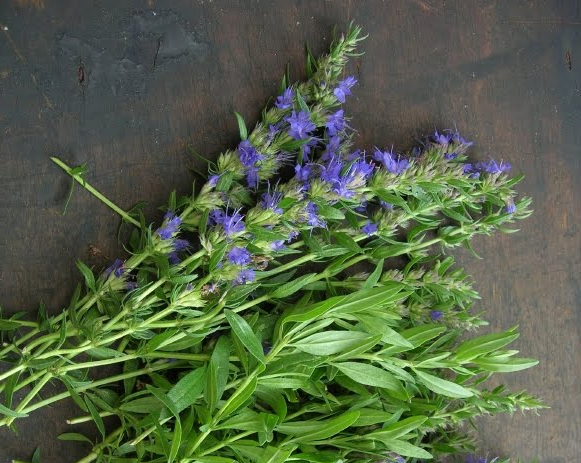The Innumerable Therapeutic Properties of Hyssop
Hyssop (Hyssopus officinalis) is usually considered to be the very plant mentioned by the name “ezob” in Psalm 51:7 (“Purge me with hyssop, and I shall be clean; wash me, and I shall be whiter than snow.” – King James Bible version), but most of Jewish exegetes think otherwise. Thus, in the 1906 Jewish Encyclopedia we can read that “the ‘ezob’ is evidently not common hyssop (Hyssopus officinalis), which is not a native of Palestine”, but either thyme-leaved savory (Satureja thymbra) or caper (Capparis spinosa), a plant with cleansing properties which seem to have been traditional in the Orient. Nevertheless, Hyssopus officinalis is a most valuable medicinal herb, known from ancient times for its antispasmodic, expectorant, diaphoretic, anti-inflammatory and anti-infectious properties, all of which make it an excellent choice for treating colds, flu, and probably all of the diseases that affect the respiratory system. It can thus be considered a plant with cleansing properties in the biblical sense, because, in order to praise God in songs, like David did, man needs to have a healthy respiratory system.

Hyssop is, as proven by its millenary traditional use, a most efficient remedy for all respiratory disorders, but its therapeutic properties are beneficial for almost all organs and systems of the body, as you can see from the list below.
Contents
Medicinal uses of hyssop
- Insomnia
- Depression, nervousness, vertigo
- Muscle pain, joint pain
- Muscle spasms
- Nausea
- Bacterial and viral infections (including ringworm and HIV infection)
- Fever
- Spasmodic cough, productive cough, sore throat, tonsillitis, asthma, bronchitis
- Low blood pressure, high blood pressure
- Poor peripheral blood circulation
- Water retention
- Arthritis, rheumatism, gout
- Premenstrual syndrome, irregular menstruations, dysmenorrhea
- Inappetence, gastrointestinal spasms, stomach ache, indigestion, vomiting, bloating, flatulence, constipation
- Instestinal worms
- Wrinkles, sagging skin, eczema, dermatitis, psoriasis
- Loose muscles, loose teeth
- Wounds, cuts, bruises, boils, bug bites
Preparation and administration
- Infusion: Add 1 teaspoon of finely cut dried plant in a cup of hot boiled water and let steep for 10 minutes. Drink 3-4 cups a day.
- Tincture: Add 50 g of finely cut dried plant in 250 ml of alcohol 70% and let it macerate for 15 days, shaking the recipient every day. Sift and store in dark coloured recipients. Take 1 teaspoon in a glass of water, 3 times a day.
- Essential oil: For external use, dilute the essential oil with sunflower, olive, sesame or sweet almond oil (1 drop of essential oil per 1 teaspoon of carrier oil). For bath, dilute 8-10 drops of essential oil in a cup of epsom salt or milk. For internal use, dilute 1 drop of essential oil in 1 teaspoon of honey; take 3-4 drops a day.




Where could I buy this remedies .? Tq